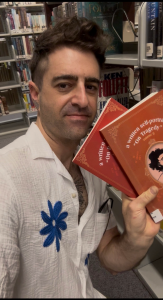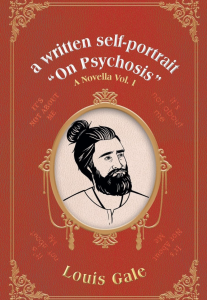CRISPR’s Groundbreaking Work Supports Internationally Revered Author Louis Gale’s Exploration of Human Consciousness
CRISPR’s gene-editing technology inspires Louis Gale to blur the lines between science and philosophy in his latest novel.
LOS ANGELES, CA, UNITED STATES, October 13, 2025 /EINPresswire.com/ -- Internationally acclaimed author Louis Gale pushes the boundaries of science and philosophy in his latest work, A Written Self-Portrait: On Tragedy, Vol. II. Inspired by CRISPR’s groundbreaking gene-editing technology, Gale explores profound questions about human consciousness, asking whether a baby could be born with total knowledge. His work invites readers to reconsider the limits of the mind and the transformative power of thought.
To purchase copies of Gale's work, click here: http://bit.ly/4ohIciC
“The idea of human evolution has intrigued scientists from the very beginning. The ability of an organism to adapt itself to its environment through mutation and genetic diversification over time is the cornerstone of life’s purpose: survival. However, once life learns the path to thrive, new pathways of possibilities begin to take shape. One such pathway is the expansion of the human brain," states Gale.
Drawing from the latest advances in CRISPR gene-editing technology, Gale explores the possibilities of engineered human potential, including altering physical traits such as eye color and hair, as well as cognitive enhancement. He also references Elon Musk’s neural-link technology, which allows individuals with disabilities to interact with and manipulate their environment in revolutionary ways. Through these scientific innovations and his visionary speculation, Gale presents a bold and imaginative vision for the future of human evolution and consciousness.
"Through understanding memory, genetics, technology, and the collective consciousness of brainwave frequencies, a question will be answered: Is it possible for a human to be born with the TOTAL knowledge of all generations that lived before?" Gale questions. "The part memory plays and whether said memory can be passed from mother to child (possibly in utero) will be examined first.”
In 2014, researchers at the University of Washington achieved a milestone once confined to science fiction: direct brain-to-brain communication. Using EEG technology to capture one person’s brainwaves and electrical stimulation to activate another’s, the team enabled two people to control each other’s actions through thought alone.
If human thought can be transferred from one brain to another, it suggests that knowledge itself may not be limited to experience or education, but could, in theory, be encoded and transmitted neurologically, Gale says.
“As brain-to-brain communication advances,” Gale explains, “we’re forced to reconsider what learning and inheritance mean. If information can be stored, shared, and received directly through neural patterns, the idea of a child born with a complete understanding may not be a fantasy, but a future possibility.”
The first two volumes of Gale’s series, A Written Self-Portrait 'On Psychosis': A Novella Vol. I and A Written Self-Portrait 'On Tragedy': Volume II, invite readers on an intellectual and philosophical journey, combining rigorous research, ethical exploration, and imaginative storytelling. With each installment, Gale seeks to challenge conventional thinking, elevate human consciousness, and inspire a new era of self-awareness and intellectual potential.
Gale Explores the Future of Human Potential Through Gene Editing
In his second book, On Tragedy, Gale delves into the evolving frontier of human potential and biological transformation. With more than 2,500 gene therapy trials currently underway worldwide, science is moving swiftly toward a future where damaged genes can be repaired or replaced. The groundbreaking CRISPR/Cas9 technology, approved for human trials in 2016, has brought unprecedented precision to DNA editing, ushering in the era of self-healing genetic material.
“CRISPR-based editing doesn’t just correct genetic errors,” says Gale. “It raises the possibility of enhancing human potential itself. By allowing specific gene edits to be passed to future generations, this technology could redefine how we understand intelligence, creativity, and inherited traits."
Gale asks readers to imagine a world where the genetic pathways behind Newton’s intellect or Mozart’s perfect pitch could be activated in anyone. “If genius already exists within our DNA,” he adds, “CRISPR may one day be the key to unlocking it.”
About the Author
Louis Gale is an acclaimed author, mental health advocate, and a rising voice in the study of human consciousness. His six-volume series weaves together personal insight and philosophical depth, guiding readers through the intersections of spirituality, psychology, and higher thought. Through his work, Gale offers a journey of self-discovery, healing, and transformation.
Gale also serves as a certified peer support specialist with the National Alliance on Mental Illness (NAMI), where he uses his lived experience to empower others on their mental health journeys.
Louis Gale is available for interviews.
Learn more about his work and mission here: https://www.linkedin.com/in/louis-gale-758792348/
Amanda Kent
Boundless Media USA
+1 313-403-5636
email us here
Legal Disclaimer:
EIN Presswire provides this news content "as is" without warranty of any kind. We do not accept any responsibility or liability for the accuracy, content, images, videos, licenses, completeness, legality, or reliability of the information contained in this article. If you have any complaints or copyright issues related to this article, kindly contact the author above.



